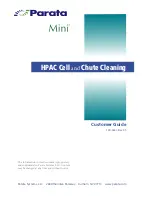
9
GB IE
handle.
f) Do not use the tool in the vicinity of
flammable liquids or gasses. Fire- and
explosion risk exist in the event of a
short circuit.
g) The blades have to be checked for
wear in regular intervals and re-sharp-
ened. Blunt blades will overload the
machine. Resulting damages are not
covered by warranty.
h) Do not attempt to repair the tool
yourself, unless you are schooled
in this field. All works, which are not
described in this manual, may only be
performed by our Service-Centre.
4) SPECIAL SAFETy DIRECTIONS
FOR BATTERy-OPERATED TOOLS
a) Ensure that the device is switched
off before inserting the battery.
In-
serting a battery into a power tool that
is switched on may result in accidents.
b) Do not subject the battery to strong
sunlight over long periods and do
not leave it on a heater.
Heat dam-
ages the battery and there is a risk of
explosion.
c) Allow a hot battery to cool before
charging.
d) Do not open up the battery and
avoid mechanical damage to the
battery.
Risk of short circuit and
fumes may be emitted that irritate the
respiratory tract. Ensure fresh air and
seek medical assistance in the event
of discomfort.
5) CORRECT HANDLING OF THE
BATTERy CHARGER
• The device must not be used by people
(including children) with limited physical,
sensory or mental faculties or who lack
the necessary experience and/or knowl-
edge - other than they are supervised
by a person responsible for safety or are
being instructed to operate the appliance
by such a person.
• Children must be supervised in order
to ensure that they do not play with the
equipment.
•
To charge the battery, use only the
charger supplied.
Risk of fire and ex-
plosion. This ensures that the safety
of the device is maintained.
•
Connect the charger only to a sock-
et with an earth. Ensure that the
mains voltage matches the specifi-
cations on the charger rating plate.
Risk of electric shock.
•
Disconnect the charger from the
mains before closing or opening
connection to the battery / power
tool / device.
v keep the charger clean and away
from wet and rain. Do not use the
charger outdoors.
Dirt and the entry
of water increase the risk of electric
shock.
•
Operate the charger only with the
appropriate original batteries.
Charging other batteries may result in
injuries and risk of fire.
•
Avoid mechanical damage to the
charger.
This can result in internal
short circuits.
•
Do not operate the charger on a
combustible surface (e.g. paper,
textiles).
Risk of fire due to heating
during charging.
• If the power cable for this equipment is
damaged, it must be replaced by the
manufacturer, a customer service agent
of the same or a similarly qualified per-
son in order to prevent hazards.
Summary of Contents for FGS 10 A1
Page 68: ...68 DE AT CH ...
Page 72: ...72 ...










































